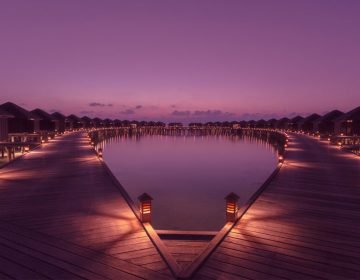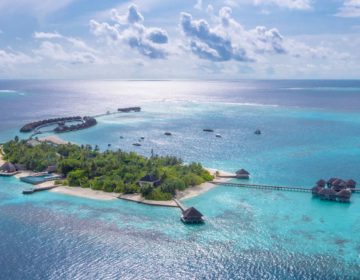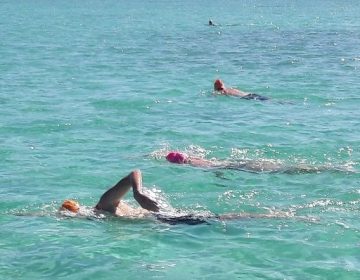The Maldives, by regional standards, has excellent health care and hygiene awareness with few poisonous animals. Staying healthy here is mainly about being sensible and careful.
Health Insurance
A travel insurance policy to cover theft, loss and medical problems is highly recommended. There is a wide variety of policies available, and your travel agent will be able to make recommendations. The policies handled by STA Travel and other student travel organizations are usually good value. You may prefer a policy which pays doctors, or hospitals direct rather than you having to settle on the spot and claim later. If you have to claim later, make sure you keep all your documentation. Some policies ask you to call a call center in your home country where an immediate assessment of your problem is established.
Some policies specifically exclude ‘dangerous activities’ which can include scuba diving. You should ensure that your policy covers air ambulances, helicopter evacuation, and an emergency flight home. If you are injured on a Maldivian resort, the closest emergency facilities will be Malé, which can be hours away by boat, but most are within reach of a landing site for a helicopter or seaplane. An injured person may need extra seats to stretch out on a plane, and somebody has to pay for them.
Even if the policy does not exclude diving accidents, it may not cover all the expenses associated with hyperbaric treatment in a decompression chamber. The decompression chambers at the Bandos Resort clinic are set up to provide emergency treatment to any diver who needs it, but it is a commercial facility. Decompression treatment usually involves between two and eight hours in the chamber and can cost thousands of dollars. A regular travel insurance policy may not cover this and divers may need an additional cover that is specifically tailored to their needs. DAN (Diver’s Alert Network) provides specialized injury and evacuation insurance and is worth considering – your local dive shop or club will have information and application forms.
Medical Kit
It is wise to carry a small, straightforward medical kit. It should include:
- Aspirin or paracetamol (acetaminophen in the US) for pain and fever
- Antihistamine (such as Benadryl), which is useful as a decongestant for colds and allergies, to ease the itch from insect bites or stings, and to help prevent motion sickness. There are several antihistamines on the market, all with pros and cons, some of which may cause drowsiness, so it’s worth discussing with a pharmacist or doctor. Antihistamines may cause sedation and interact with alcohol so care should be taken when using them.
- Calamine lotion or Stingose spray – to ease irritation from bites or stings
- Bandages and Band-Aids
- Scissors, tweezers, and a thermometer (note that mercury thermometers are prohibited by airlines)
- Cold and flu tablets and throat lozenges
- Insect repellent, sun block, chapstick

Health Preparations
Make sure you are healthy before you start traveling. If you wear glasses, take a spare pair and your prescription. New spectacles can be made in Malé, cheaply and competently.
If you require particular medication take an adequate supply, as it may not be available locally. Take the prescription or, better still, part of the packaging showing the generic rather than the brand name (which may not be available locally), as it will make getting replacements easier. It’s wise to have a legal prescription or a letter from your doctor with you to show that you legally use the medication.
Bring an adequate supply of condoms and contraceptives. These are available in Malé, but only on prescription to married couples.
Diver’s Medical Check
If you plan to do a diving course in the Maldives, you should get a diving medical check-up before you leave. There’s a particular form for this, and a dive school can insist on a diving health certificate before you do your course. A local diving club or dive shop will have a list of doctors who can do this. Private clinics in Malé and Bandos Resort can also do a diver’s medical certificate, but why waste your holiday time.

Immunizations
Vaccinations protect against diseases you might meet along the way. The only vaccination officially required by the Maldives is for yellow fever if you’re coming from an infected area. Recommended, though not legally required, are vaccinations against hepatitis A, tetanus, and polio.
Tetanus and Diphtheria
Boosters are necessary every ten years and protection is highly recommended.
Polio
A booster of either the oral or injected vaccine is required every ten years to maintain out immunity gained from childhood vaccination. Polio is a severe, easily transmitted disease which is still prevalent in many developing countries.
Hepatitis A
This is not common in the Maldives but can be prevented by vaccination, so it’s worth considering. Havrix 1440 provides long-term immunity (possibly more than ten years) after the initial injection and a booster at 6-12 months. It will take about three weeks to provide satisfactory protection. Another option is gamma globulin, a ready-made antibody which reduces the chances of hepatitis infection. It should be given as close as possible to departure because it is most effective in the first few weeks after administration, but protection declines gradually over three to six months.
Yellow Fever
Protection lasts ten years and is recommended where the disease is endemic, chiefly in Africa and South America.
Basic Rules
Care in what you eat and drink is the most important health rule, but in a Maldivian resort, stomach upsets are unlikely, and at worst will be minor and temporary. Even eating in the local tea shops in Malé, you are unlikely to have any problems.
Water
The usual number-one rule is don’t drink the water, and at most Maldivian resorts the management endorses the rule and suggests you buy bottled water. In fact, the tap water at most resorts is desalinated sea water and is probably alright to drink. It may be very salty but is unlikely to contain harmful bacteria, unless it has picked up something in the storage tank or the pipes. Tea, coffee, juice, ice, and anything washed in the water will be ok. Some resorts provide jugs of drinking water which is collected straight from the desalination plant. Malé guesthouses provide drinking water for the public supply, which is also desalinated.
Food
Eating in a resort is as safe as in any modern restaurant in Western Europe. All food is prepared in well-run commercial kitchens, and most ingredients are imported from reputable suppliers, in proper packaging or under refrigeration. Because the resort is the sole provider of food to the guests, management has complete responsibility for it and takes the responsibility very seriously. Any problem is likely to strike a number of guests at the same time, and both the tour and wholesalers and the Ministry of Tourism will take the management to task. They know the reputation of their industry is at stake and the reputation for hygiene is exceptionally high.
There may be a higher risk in local eateries, where food is laid out on tables, and you help yourself. Overwhelmingly, however, these places are very clean, as are the staff and other patrons. The experience of eating Maldivian food is worth the minimal danger of an upset stomach.

Nutrition
The traditional local diet consists of mainly fish, coconut and rice, with some onions, chillis, bananas, and breadfruit. There is some evidence that this diet is deficient in fresh vegetables and iodine. Resorts serve more varied selections, with more meats, fruit, and vegetables. You should get all the protein, carbohydrate and vitamins you need. Make sure you drink enough – don’t rely on feeling thirsty to indicate when you should drink. Not needing to urinate or very dark yellow urine is a danger sign. Carry a water bottle on long boat trips.
Everyday Health
Keep out of the sun when it’s hot and take care to avoid sunburn. Biting insects are not usually a problem but use a repellent if any are around.
Medical Problems and Treatment
Self-diagnosis and treatment can be risky, so seek qualified help if you need it. Some large resorts have a resident doctor, but otherwise, it may be necessary to do into Malé or have a doctor come to you. This is when that medical insurance comes in handy.
Environmental Hazards
Sunburn
In the Maldives, you can get sunburn surprisingly quickly, even through the cloud. A hat provides the best protection for your face and neck. Use sunblock and take extra care to cover areas that don’t usually see the sun like your feet. Use zinc cream or some other barrier cream for your nose and lips. Calamine lotion relieves the pain of mild sunburn. Protect your eyes with good quality sunglasses.

Prickly Heat
Prickly heat is an itchy rash caused by excessive perspiration trapped under the skin. Keeping cool, bathing often, using mild talcum powder or staying in an air-conditioned room may help until you acclimatize.
Heat Exhaustion
Dehydration or salt deficiency can cause heat exhaustion. Take time to acclimatize to high temperatures and make sure you drink sufficient liquids. Wear loose clothing and a broad-brimmed hat. Do not do anything too physically demanding.
Salt deficiency is characterized by fatigue, lethargy, headaches, giddiness and muscle cramps and in this case, salt tablets may help. Vomiting and diarrhea can deplete your liquid and salt levels. Anhidrotic heat exhaustion, caused by an inability to sweat, is quite rare. Unlike other forms of heat, fatigue it is likely to strike people who have been in a hot climate for some time, rather than newcomers.
Heat Stroke
This serious, sometimes fatal, the condition can occur if the body’s heat-regulating mechanism breaks down and the body temperature rises to dangerous levels. Long, continuous periods of exposure to high temperatures can leave you vulnerable to heat stroke. You should avoid excessive alcohol or strenuous activity when you first arrive in a hot climate. The symptoms are feeling unwell, not sweating very much, or at all, and high body temperature (39˚C to 41˚C or 102˚F to 106˚F). Where sweating has ceased the skin becomes flushed and red. Severe, throbbing headaches and lack of coordination will also occur, and the sufferer may be confused or aggressive. Eventually, the victim will become delirious or convulse. Hospitalization is essential, but in the interim get victims out of the sun, remove their clothing, cover them with a wet sheet or towel and then fan continually.
Fungal Infections
Fungal infections, which occur with higher frequency in hot weather, are most likely to occur on the scalp, between the toes or fingers, in the groin and on the body (ringworm). You get ringworm (which is a fungal infection, not a worm) from infected animals or by walking on damp areas, like shower floors.
To prevent fungal infections wear loose, comfortable clothes, avoid artificial fibers, wash frequently and dry carefully. If you do get an infection, wash the infected area daily with a disinfectant or medicated soap and water, and rinse and dry well. Apply an antifungal cream or powder like the widely available Tinaderm. Try to expose the infected area to air or sunlight as much as possible and wash all towels and underwear in hot water, as well as changing them often.

Motion Sickness
Eating lightly before and during a trip will reduce the chances of motion sickness. If you are prone to motion sickness try to find a place that minimizes disturbance – near the wing on aircraft, or close to midships on boats. Fresh air usually helps; reading and cigarette smoke doesn’t. Commercial motion-sickness preparations, which can cause drowsiness, have to be taken before the trip commences; when you’re feeling sick, it’s too late. Ginger and peppermint are natural preventatives.
Jet Lag
Jet lag is experienced when a person travels by air across more than three time zones (each time zone usually represents a one-hour time difference). It occurs because many of the functions of the human body (such as temperature, pulse rate and emptying of the bladder and bowels) are regulated by internal 24-hour cycles called circadian rhythms. When you travel long distances rapidly, your body takes time to adjust to the ‘new time’ of the destination, and you may experience fatigue, disorientation, insomnia, anxiety, impaired concentration, and loss of appetite. These effects will usually be gone within three days of arrival, but there are ways of minimizing the impact of jet lag:
- Rest for a couple of days before departure; try to avoid late nights and last-minute dashes for traveler’s cheques, passport, etc
- Try to select flight schedules that minimize sleep deprivation; arriving late in the day means you can go to sleep soon after you arrive. For very long flights, try to organize a stopover.
- Avoid excessive eating (which bloats the stomach) and alcohol (which causes dehydration) during the flight. Instead, drink plenty of non-carbonated, non-alcoholic drinks such as fruit juice or water.
- Avoid smoking, as this reduces the amount of oxygen in the airplane cabin even further and causes greater fatigue.
- Make yourself comfortable by wearing loose-fitting clothes and perhaps bringing an eye mask and earplugs to help you sleep.
Infectious Diseases
Diarrhoea
A change of water, food, or climate can all cause the runs; diarrhoea caused by contaminated food or water is more serious. You may still get a mild bout of traveler’s diarrhea, but a few rushed toilet trips with no other symptoms is not indicative of a serious problem. Dehydration is the main danger with any diarrhea, particularly for children for whom dehydration can occur quite quickly. Fluid replacement remains the mainstay of management. Severe diarrhoea is unlikely.
Hepatitis
Hepatitis is a general term of inflammation of the liver. There are many causes of this condition; drugs, alcohol, and infections are but a few.
Tetanus
This potentially fatal disease is found worldwide, occurring more commonly in undeveloped tropical areas. It is difficult to treat but is preventable with immunization. Tetanus occurs when a wound becomes infected by a germ, so clean all cuts, punctures or animal bites.
Sexually Transmitted Diseases
There are numerous sexually transmitted diseases. Effective treatment is available for all except herpes and AIDS. Remember to take a supply of condoms as they are readily available in the Maldives.
Insect-Borne Diseases
Mosquitoes are not a significant problem in Maldivian resorts because there are few areas of open fresh water where they breed. If you’re in a room with air-conditioning, or there is a ceiling fan to keep the air moving, mosquitoes are unlikely to trouble you. If they do, use repellent or burn mosquito coils – both are available from resort shops.
Malaria
This severe disease is spread only by mosquito bites. The Maldives is not regarded as an area of endemic malaria and prophylaxis is not recommended.





[…] og dokumentasjon som visum, pass og reiseforsikring. Skal du for eksempel til Maldivene er det påkrevd med vaksine for gulfeber dersom du kommer fra et risikoområde. Ellers er det anbefalt med Hepatitt A-vaksine, […]
Is tourists are allow to carry condoms from their country to Maldives?
Hi there,
Yes it is fine as far as we know. Just make sure they are in your check-in luggage.
Hi
Is Viagra medication allowed in Maldives customs